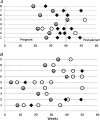The first Plasmodium vivax relapses of life are usually genetically homologous
- PMID: 22194628
- PMCID: PMC3266132
- DOI: 10.1093/infdis/jir806
The first Plasmodium vivax relapses of life are usually genetically homologous
Abstract
In a prospective infant cohort, 21 infants developed Plasmodium vivax malaria during their first year. Twelve of their mothers also had vivax malaria in the corresponding pregnancies or postpartum period. The genotypes of the maternal and infant infections were all different. Eight of the 12 mothers and 9 of the 21 infants had recurrent infections. Relapse parasite genotypes were different to the initial infection in 13 of 20 (65%) mothers compared with 5 of 24 (21%) infants (P = .02). The first P. vivax relapses of life are usually genetically homologous, whereas relapse in adults may result from activation of heterologous latent hypnozoites acquired from previous inoculations.
Figures

Comment in
-
Source of homologous parasites in recurrent Plasmodium vivax malaria.J Infect Dis. 2012 Aug 15;206(4):622-3. doi: 10.1093/infdis/jis393. Epub 2012 Jun 13. J Infect Dis. 2012. PMID: 22696499 No abstract available.
References
-
- Looareesuwan S, Wilairatana P, Krudsood S, et al. Chloroquine sensitivity of Plasmodium vivax in Thailand. Ann Trop Med Parasitol. 1999;93:225–30. - PubMed
-
- Luxemburger C, van Vugt M, Jonathan S, et al. Treatment of vivax malaria on the western border of Thailand. Trans R Soc Trop Med Hyg. 1999;93:433–8. - PubMed

